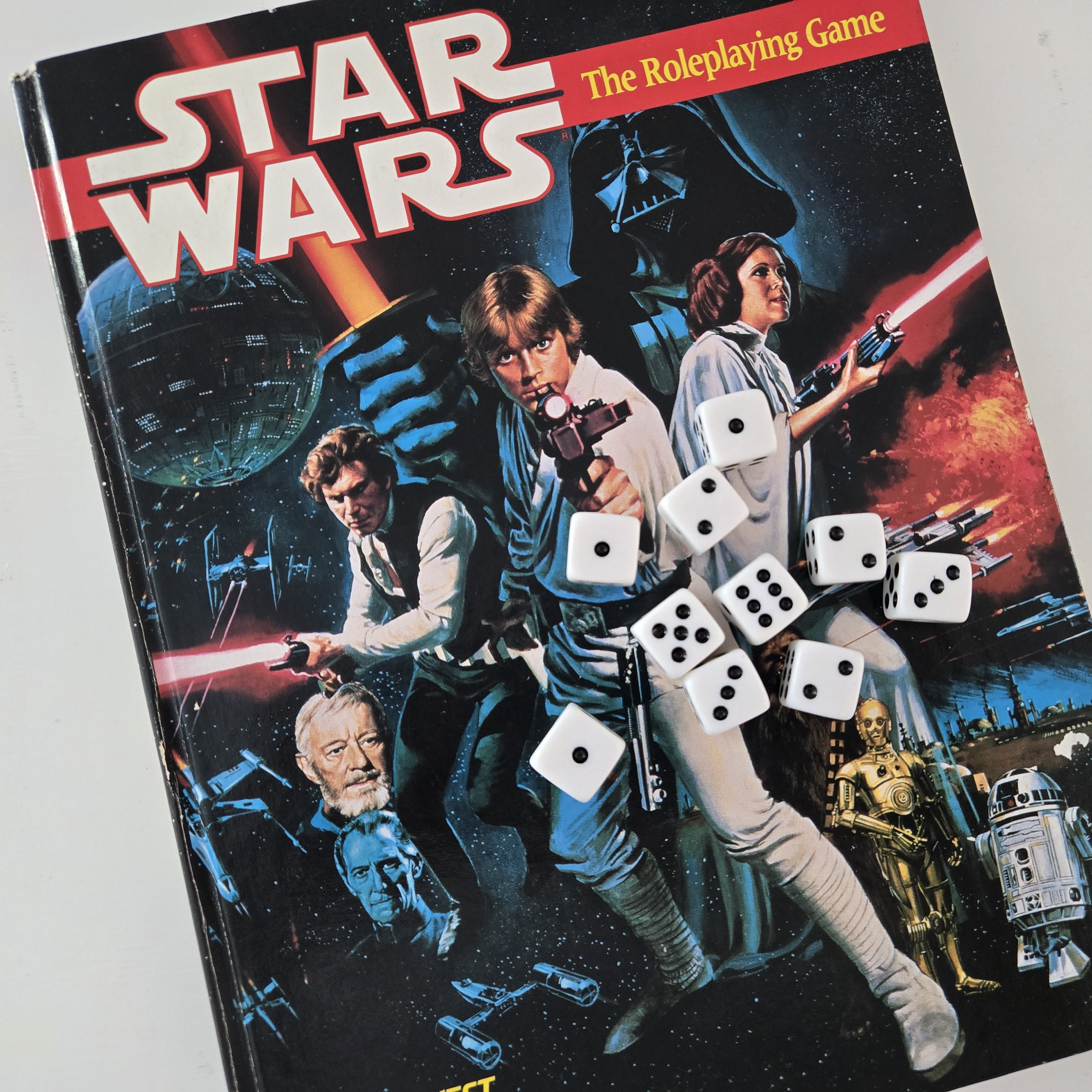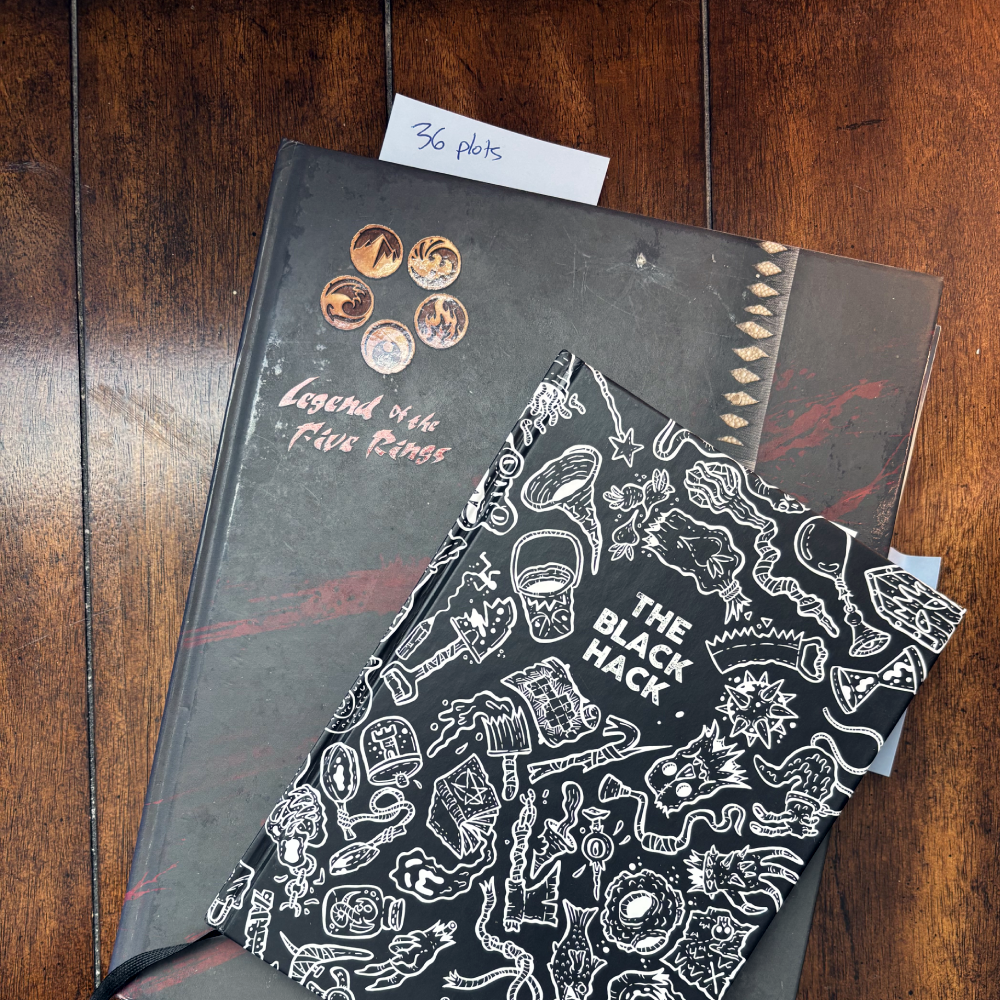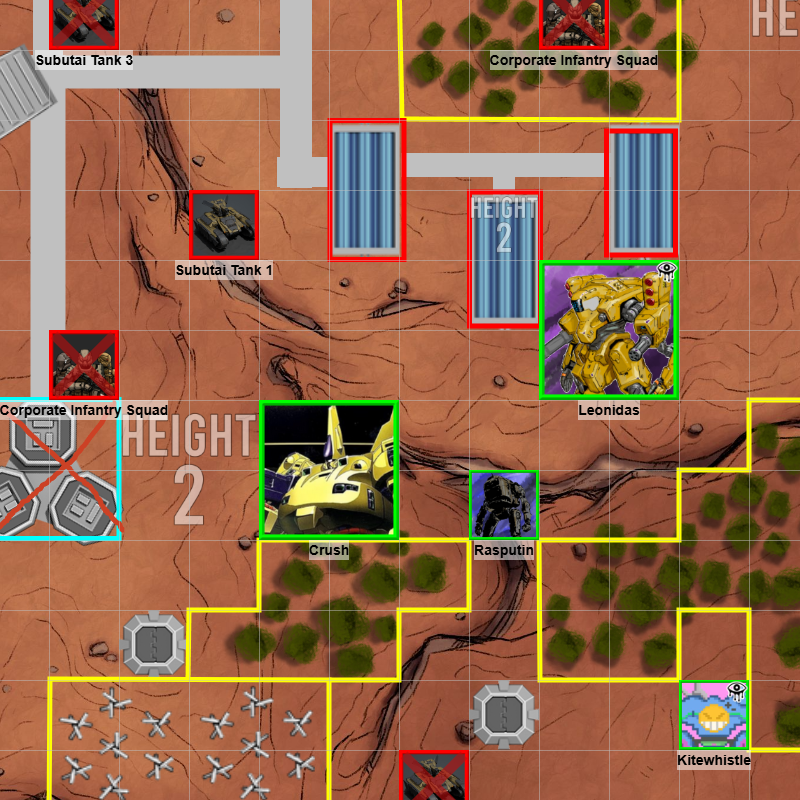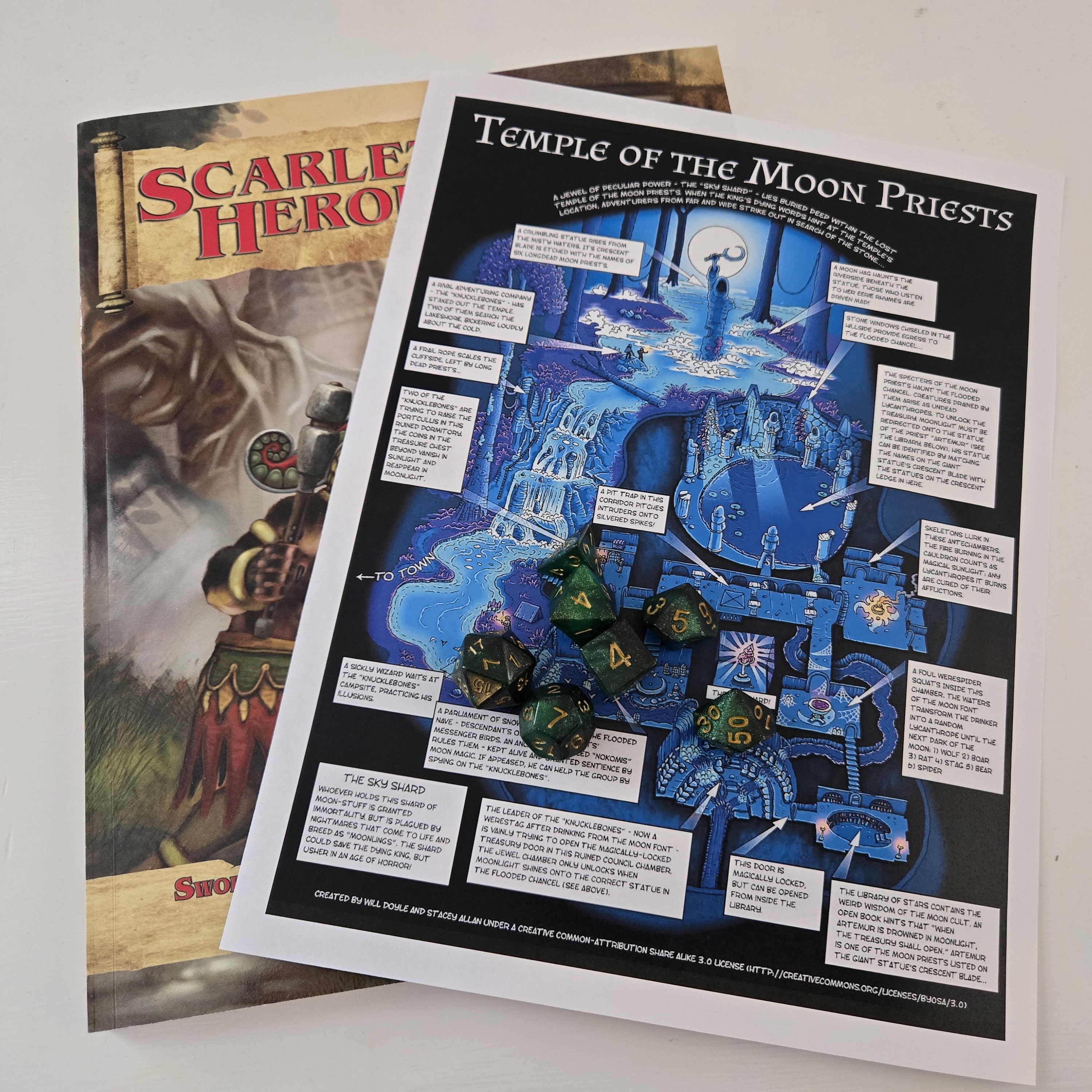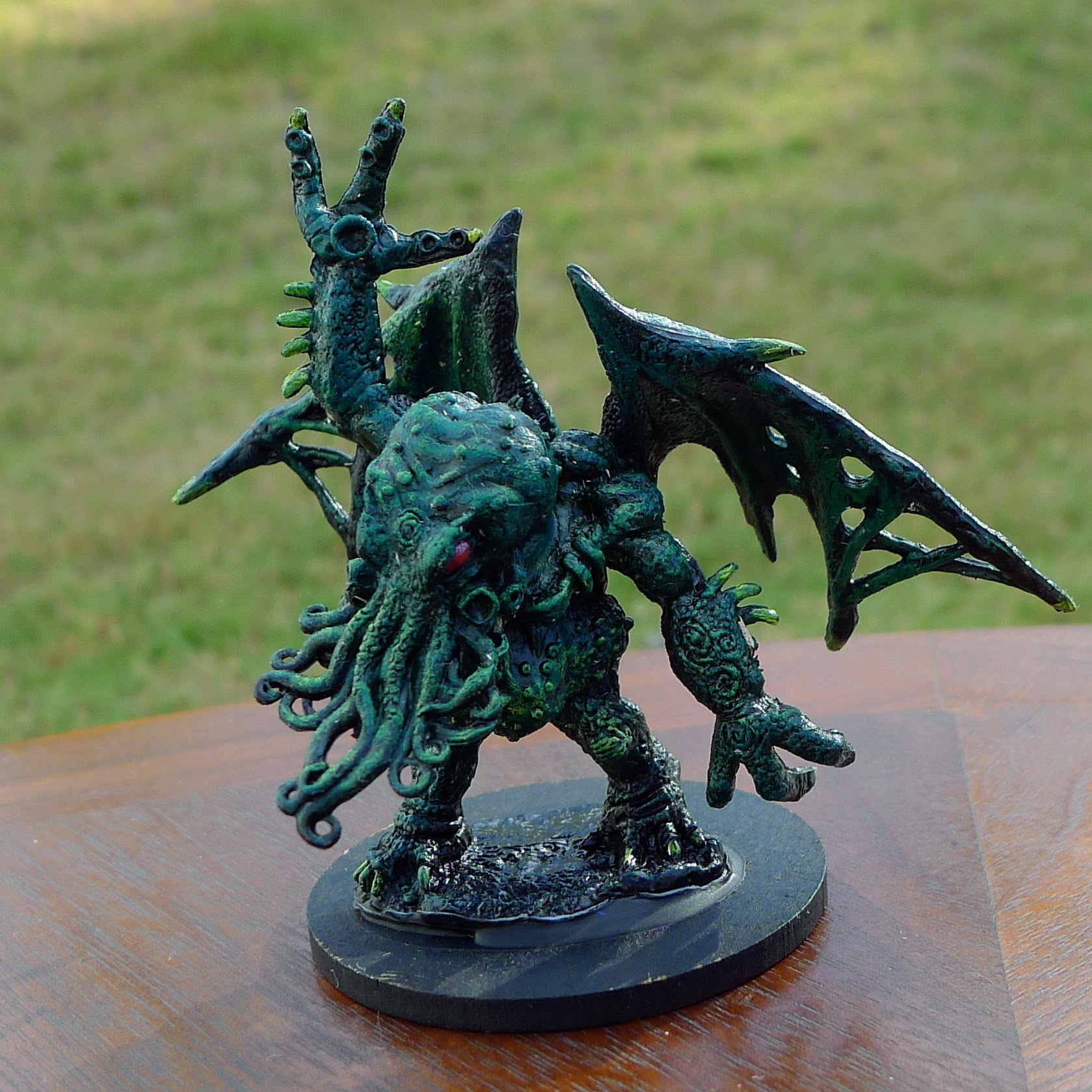[00:00:00] Speaker A: RPG Lessons Learned. When the game is over, when your players are gone, that's when lessons are learned.
Find us
[email protected].
email us at rpgllpodcastmail.com and find us on BlueSkyPGL.
Hi, welcome to RPG Lessons Learned, the show where you can learn from our mistakes. I'm Dusty, and me, as always, is Tanner. Hi, Tanner.
[00:00:34] Speaker B: Good evening, Dusty. How you doing, man?
[00:00:36] Speaker A: I'm doing all right. I'm digging this thing we're doing of, uh, recording immediately after playing. And this is at this moment immediately after we have just played. What do we just play?
[00:00:47] Speaker B: We just played the West End Games Star Wars D6 system, which has a lot of fans out there. And we played a one on one adventure that you were kind of play testing called Escape from Drasana.
[00:01:00] Speaker A: Yes. Why do I feel this need to write my own adventures? Actually, I'll tell you why. Because I wanted a, uh, one on one adventure. And while I could find many, many, many solo adventures for western game Star Wars D6, I could not readily find a one on one adventure solo.
[00:01:18] Speaker B: Being like, almost like choose your own adventure type.
[00:01:20] Speaker A: Very much so, yes, yes. And one on one, I think, is such an underrated way to play.
[00:01:27] Speaker B: And it's probably kind of an underserved market too. I mean, God, it's so, it's so hard to get larger groups of people together. I mean, that's why we, we play it this way, right? We get, we're two guys who get along, who can schedule with one another and the game is there for us.
[00:01:41] Speaker A: Absolutely. Now we played the first edition of Star Wars D6 and I'm sure there are Star Wars D6 purists who are going, oh God, why?
Second edition was so much better. And, and there are fan editions that bring the game into the modern era of game design. But the simple reason is I bought the reprints from a couple of years ago and I just wanted to write an adventure purely out of those reprints. And it was fun.
[00:02:12] Speaker B: Yeah, I had a good time. What would you rate the session on a scale of 1 to 10?
[00:02:17] Speaker A: Ooh, I expect to rate it higher than you because for me the session includes writing the adventure and I think flipping through the books and writing the adventure was a lot of the fun for me and I really enjoyed that. And then the session, it had some, some rough spots, so I really enjoyed pulling this adventure together. I'm going to rate it like a seven and a half or an even an eight.
I'll go whole number. I'll Go ballsy and do an 8. Though I fully expect you to rate it lower because the session itself was nowhere near the fun I had of m making the adventure.
[00:02:48] Speaker B: Isn't that so interesting sometimes? You are correct, though. I would give this like a 6 out of 10 my whole experience with it. But yeah, it's um. There were. There were some great parts. There are some parts that made me smile and hoot and holler a little bit. But there are also some parts that were a little bit of a drag or a little bit unclear. And maybe that's my fault for not completely grokking the system yet. But I'm excited to discuss that.
[00:03:13] Speaker A: Let's do, um. You want to do fun part first or not so fun, draggy part first?
[00:03:19] Speaker B: I don't want to end on a poor note, so I would. I'll start with my. My criticisms of it.
So the concept of this is that you're a droid waking up in the maintenance bay where your restraining bolt has been removed and you are escaping an Imperial shipbuilding facility.
[00:03:36] Speaker A: Correct.
[00:03:37] Speaker B: I think that for a one on one game, a droid is a bad pick mechanically because the way that droids work is that they have a, uh, one in everything except like three skill that they're super good at, which makes sense in the narrative. Like a protocol droid knows languages. It does not know how to shoot a blaster, it doesn't know how to fix a starship. It's a very specific kind of computer. I think that in one on one games you need some coverage. And the only reason this wasn't a total disaster for my character was that halfway through the first encounter, we said, I can use a force point to, uh, simulate other skills.
[00:04:22] Speaker A: True.
I think a couple things.
One, I think we would have had that issue with just about any character. If I flip, for example, to the templates, the first edition of Star Wars D6 was based on templates.
Well, no, I'll grant you that you're right. Here's why you're right. Star Wars D6 is a system based on both attributes and skills.
And if you raise an attribute to like three die, then you automatically get a three die. Get three die in each one of those skills.
[00:04:55] Speaker B: Right.
[00:04:55] Speaker A: So I was thinking all characters are somewhat specialists, but really droids are just very unusual that way and being very, very specialized.
[00:05:04] Speaker B: And in the book it talks about, it's like, hey, droids should not be player characters generally because they are so specialized. However, if you want to do this, and once I read that, I'm like Is this a good idea? I don't know. So basically, my only option for beating a challenge was A, hope it's one of my three skills, or B, try and BS using one of my three skills to convince you who was very agreeable and we're having fun with it, but convince you that actually I can use Search for this.
[00:05:36] Speaker A: Yep.
[00:05:37] Speaker B: And I think that we were not playing in the spirit of the system.
Whether that's a good thing or a bad thing. You know, we had a good time with it and we made it work. But, uh, if I had to critique this adventure, I would say this adventure works because, Dusty, you, the gm, were running it, not because the system of droids and the way droids work support what this adventure was. So if you do publish this adventure, I would. I mean, I love the narrative setup of being a droid who is newly awakened, who has rebellious tendencies and wants to escape the facility. I would put basically our house rule that we came up with in the text of the adventure and say, hey, editor's note. Droids are very specialized. A, let players get away with using creative ways to use those skills, and B, give them an extra force point, and they can use a force point to do this with half. Half the dice or whatever.
[00:06:34] Speaker A: Maybe. Or maybe I just, like, drop the droid thing and maybe you're. Well, that gets into the whole notion of, like, compelled labor. I'm trying to avoid the word.
[00:06:43] Speaker B: Yeah, uh, of course. But like. But, uh, I mean, like, would this adventure be difficult to rewrite if I was a smuggler who was imprisoned by the Empire and I was trying to bluff my way out? No, probably not, because then there would be a reason to, you know, get into a shootout. But like, like, I would avoid combat at all costs. With my droid character, I had a blowtorch and one die in the skill to use it. So, like, like, combat for me as a gamer, um, what my equipment was and what my setup was, I'm just like, oh, if I get into combat, I'm just going to die. So I need to try and skirt the rules elsewhere.
[00:07:22] Speaker A: I just fell in love with the idea of, like, Star wars droids, like the cartoon show Star Wars Droids and having a droid based adventure. The other thing I could do is just throw out the rule about droids only having three skills make droids more like normal PCs who can have attributes as well as skills.
[00:07:40] Speaker B: Or maybe you could do something like every time you interface with a computer in the system or like, in the adventure, as a droid you can add three dice to a skill. So that way you can kind of plan, you know, what you're doing. You can say, oh, you're downloading data logs or something like that temporarily or something like that. I don't know. Or you could build, I mean, building a droid character. It says yes. You know, you can only have these three skills. That being said, if you had a pre made droid for this adventure that had a normal spread of skills, what would that break?
[00:08:12] Speaker A: Yeah, that's true.
[00:08:13] Speaker B: It would break the rules for character creation.
But in play, wouldn't that be so much better? You know, it would.
[00:08:20] Speaker A: And it feels more like, uh. So my favorite droid in all of Star wars. If I say HK47, do you know who that is?
[00:08:26] Speaker B: Yeah, from Kotor.
[00:08:27] Speaker A: Yeah, absolutely. My favorite droid in all of Star Wars. There's no way HK47 is described by these rules.
[00:08:34] Speaker B: Correct. Or R2D2.
[00:08:36] Speaker A: Frankly, yes. Now, HK47 came long after 1987, but to your point, R2D2 can do more than three things.
[00:08:42] Speaker B: Yes. So I would say you could avoid. Instead of having to rewrite this whole adventure, I would provide a pre generated character or rules for making a pre generated droid that were different and say, hey, in the spirit of one on one games, your player has to be able to cover more types of situations. Therefore, we're giving a slightly different droid, here's 24 dice, and distribute them, um, among six skills or something like that.
[00:09:11] Speaker A: Yeah, that's a good idea. And I think the justification for that is the same justification as HK47. HK47 was built long ago by some mysterious Jedi master. Yeah, and that's why he is such a special and strange droid with so many weird capabilities.
[00:09:25] Speaker B: Or you can say once your restraining bolt was knocked off, it rewired part of your brain. Like you're suddenly good at things that are not within the purview of being a construction droid.
[00:09:35] Speaker A: The other thing I could do, Tanner, is look at subsequent editions of Star Wars D6 and see if they have the same droid restrictions.
[00:09:42] Speaker B: Right. Or look at like if there's a stat block for a hero droid like a C3PO or an R2D2 and look at their stats and say, were they built using these rules? I doubt it.
[00:09:54] Speaker A: That's fair, right? That's great feedback. I do have this blind spot that you clearly saw coming a mile away where I fall in love with the concept and sometimes the practicality of it won't fade. Amaze me. Or bother me until I'm at the table. And I don't know why I have that blind spot, but, man, I do.
[00:10:11] Speaker B: Yeah. And I think. I think we've probably discussed this before in some other context. True. Like, probably the Mystery Con. Remember when we did the Colombo at the. Not East Texas University Miskatonic when we did that? I think we had a similar conversation then where it's like, I had such a cool idea. Once the rubber hit the road, it became clear that maybe it could have been tweaked. And I'm not saying this adventure was bad, because I got to do Star wars stuff. I got to cleverly use my skills. We got in a starship battle at the end. The ending of this thing was awesome. The epilogue. Yeah, I think it's. I think it's cool. I just think that. Yeah. That me, the character, I'm only interfacing with the sheet I have, so that needs to be more robust.
[00:10:55] Speaker A: I think that's fair. Here's how I thought I'd overcome the Columbus thing. And I'm not saying I did. Clearly I didn't. But here's how I thought I did. I had this adventure flow where I had much more of a branching path. In fact, I had two paths where you could bounce back and forth. In between them, I had a success path and a failure path. And any failure of any scene would drop you onto the failure path. And if you succeed, you get back to the success path. Cool. So I had all these different options, these peer options. I had. In addition to the main path, which was the maintenance bay, the factory floor, the transportation hub, and the spaceport, I had the incinerator, the ventilation shaft, the cargo bay, and the.
And the escape run. So I had this separate and distinct failure path, which I thought would overpower the Columbo. But I was thinking about the Columbo adventure being the one solution to the mystery.
[00:11:46] Speaker B: Right.
[00:11:46] Speaker A: I wasn't thinking about the Columbo solution being a blind dedication to a concept.
[00:11:52] Speaker B: And you know what? I want to give you props for your two different paths. I think that in my mind, I would love to know.
So, okay, so I'm running a Lancer adventure, right? And, uh, we talked about this last time. And in the adventure, you have a combat encounter. And whether you win or lose the combat encounter, you don't wipe and die.
If you lose the combat encounter, it means you get to the next combat encounter or the next story beat with a penalty. Maybe civilians died. Maybe you got beat up. Maybe some other important thing was Lost. But it's a, It's a very fail forward adventure. Right.
I as a player need to know when something is fail forward. So I'm going to tell my players this is a fail forward type of adventure. If you die, it's not going to be the end of the world. You're just going to move on to the next encounter with some issues.
[00:12:48] Speaker A: That was my intent. I should have stated it.
[00:12:51] Speaker B: And you and I know that we like metagaming, right? So I would say maybe even include that in the adventure. It says, hey, if your players are worried about the consequences of dying or messing up an adventure, maybe let them know, hey, there's always going to be a way forward.
A failed role with the security droid will not instantly lead to you being destroyed. Something like that.
[00:13:14] Speaker A: Okay.
[00:13:15] Speaker B: Because then that opens the experimentation space so much more. Right. I'm more likely to experiment with a skill that maybe I have three dice in instead of four dice.
[00:13:23] Speaker A: That's fair. All right, good feedback. Question for you.
[00:13:26] Speaker B: Mm, mhm.
[00:13:27] Speaker A: The opening narration. So to me, Star Wars D6 adventure, starting with, uh, Rebel Breakout and then continuing with Tatooine Manhunt, have this opening script, uh, where the game master and the players all read from the script as if it was, you know, seventh grade and you're reading through Romeo and Juliet as a class and it's meant to, like, set the stage for the adventure.
Did that do anything for you?
[00:13:54] Speaker B: I love it. I really do. It's so funny because I asked my fiance about that and I, I asked her and I said, hey, isn't that cool that this, like, old star. Because she really likes the, uh, the modern Star wars systems? And I said, hey, isn't it cool that like, these old adventures were written this way? And she says, that sounds horrible. I would never want to be called to reading class.
So I want to say, as a person who enjoyed being called on to reading class, I did like it. Um, I think it's kind of cheesy, kind of hokey. It makes me feel like we're listening to a cool radio play or something like that. I'm a big fan of that. I would, I don't know if I'd want it in things that aren't Star wars, but I do like it in this.
[00:14:32] Speaker A: Did it help you get in the character?
[00:14:34] Speaker B: Yeah, absolutely. Because the droid that was talking to me was giving me prompts. The droid clearly gave me, like, my first goal for this quest.
And yeah, it instantly got me talking in character, which I think is maybe.
[00:14:49] Speaker A: The goal of it, What I was nervous about was writing lines for the PC. Like so many modern. So much modern advice revolves around not taking away player agency.
So I tried to make your lines, or the PC's lines, I should say, as vanilla as possible where they could be read with any personality.
[00:15:07] Speaker B: Did I achieve that big success on that? Because I definitely put my own intonations on there. I think you're probably safe to write any sort of line that asks for more information because I think pretty much every character would ask for more information about a situation.
But yeah, you. I think you. You nailed it.
[00:15:27] Speaker A: All right, so opening narration. Good.
Um, level. Another criticism. Do you have a second criticism?
[00:15:34] Speaker B: The Starship combat at the end was, was cool. I love that as a finale.
I wish I would have understood it a little bit more and my goal.
So I guess we should say I lost the Starship Combat and that's how our epilogue got read. I won't spoil it if you want to read the adventure because it's cool. I guess my goal, I knew that I had to just survive three turns.
My goals suddenly became just kill one of the two TIE fighters and then survive. And I failed at that. So I don't know. I like, I think that there are cool decision making moments in there. But yeah, it's just. It was clearly the most mechanically complex part of the, uh, the scenario. Because up to then it was just kind of skill challenge, skill checks and skill challenges. And I don't think that's bad, but it is a consideration, I would say.
[00:16:29] Speaker A: So a couple things. One, you successfully avoided all the combats, all the melee combats. Okay. Uh, so we didn't get to really experience the combat system. The one time we almost started combat, we did an end run around combat with the maintenance remotes. But with Starship Combat, I really wanted to shoehorn that into the adventure because I wanted this adventure to be kind of a tour de force of what the system has to offer.
[00:16:51] Speaker B: Absolutely.
[00:16:52] Speaker A: In Starship Combat Vehicle Combat, where you're adding your starship piloting plus, uh, the maneuverability of the ship, or you're adding your starship gunnery plus the fire control plus, I really wanted that in here somewhere. But I knew it was a risk that even two TIE fighters would be overwhelming. I even cut the TIE fighters maneuverability and try, uh, to nerf them a little bit. And still the TIE fighters were overwhelming to the freighter.
[00:17:21] Speaker B: I think that if I had more skill points that helped me in Starship Combat, I would find the two TIE fighters not to be as overwhelming. And to be fair, I think I got a couple bad roles in there too, which always, you know, in a one on one game, things can be a little bit swingier just because you don't have multiple players to insulate the. The failure.
That being said, if you know this adventure is going to have starship combat, which you do is. Sorry, I guess I should ask. Is there a version of the path I could take that did not involve starship combat at the end?
[00:17:57] Speaker A: Yes. Okay. There are two paths that don't involve starship combat. If you fail in the cargo bay, you wind up as cargo and we roll to find out what planet you wind up on.
[00:18:10] Speaker B: Very fun.
[00:18:10] Speaker A: And if you fail in the spaceport, that is arguably the saddest ending where you wind up back at your workstation with a working restraining bolt and a memory wipe. A vague sense of.
If you could just get this restraining bolt off, you could get out of here.
[00:18:26] Speaker B: That's so sad. That's really sad.
Um, okay, so in that case, I'll rescind my. I was going to say, hey, make sure that the droid has starship skills, but I will rescind that.
[00:18:39] Speaker A: No, no, I think, I think it's fair. I was just thinking it before you said it. I know it's in the adventure. I think the right path here is just to make a pre made character. This is the character for this adventure.
[00:18:49] Speaker B: Yeah. And especially as an intro for like a one on one game. Like have as little friction as possible. You're already writing this adventure to be as easy as possible for the gm and I think you're doing a good job making it as easy as possible for the player too. Just give them, give them a charact. They can just roll. No need to consult the rule book and roll a character. They can just jump right in.
[00:19:08] Speaker A: All right, good call. I think, I think a pre made droid is the way to go. And maybe updating the adventure to a later version of Star Wars D6. If that later version has different droid creation mechanics, I will investigate that on my own. Anything that you enjoyed from the adventure that you'd want to point out, it.
[00:19:25] Speaker B: Felt like Star wars, honestly, like you nailed that. And that's kind of the most important part of a Star wars adventure to me. I could imagine every. I mean, I'm a Star wars dork, so. But I could imagine every space we were in. We were in an industrial droid repair facility just like they had kind of on Jabba's palace. There was a assembly line kind of like in Attack on the Clones, you know, there was a spaceport to escape from, like in A New Hope. Like all these things. Like, Star wars is so good at creating these evocatives, uh, scenes and scenarios and settings, and I instantly could imagine myself there.
So I think that you made this feel like Star wars and I love that.
[00:20:08] Speaker A: I appreciate that. I worked the hardest at the Star wars feel.
[00:20:12] Speaker B: Yeah.
[00:20:12] Speaker A: Well, last question for you. Would you want to try Star Wars D6 again with a non droid character?
[00:20:18] Speaker B: Yes, definitely. This is a cool system. I was. We didn't talk about the system very much and maybe if we play some more, we can get into that a little bit more. But I said this right when we started our call. I'm like, I am impressed at how elegant and interesting the system is for its time. I understand. I knew that people loved the system, but I get it now. I get how people could fall in love with this system so much and I would love to. Um, I love playing Star wars, man. I'll play Star wars anytime.
[00:20:48] Speaker A: Cool.
So I can find something in a more modern version of Star Wars D6 that maybe does or doesn't hopefully, fingers crossed. Have uh, one on one adventure already pre written so they don't have to make my own.
[00:20:59] Speaker B: And then maybe I could run like Edge of the Empire for you afterwards.
[00:21:04] Speaker A: We could compare and contrast a system with pictogram dice. I'm not sure how I feel about that, Dusty.
[00:21:09] Speaker B: It's a brand new world. You're going to have to come to the future. Well, now those have kind of fallen.
[00:21:13] Speaker A: Out of favor already, but I still haven't done it. I'd be curious to give it a shot and see.
[00:21:16] Speaker B: It's a cool. There's some great digital dice rollers for it that, that make it quite fun. So cool.
[00:21:21] Speaker A: All right, well, Tanner, thank you for playing and anyone listening. Thank you for listening.
People call them reviews, postmortems, retrospectives.
We call them lessons learned and we're sharing ours with you.
